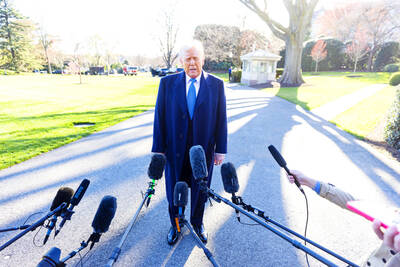As NASA sets course for the moon and Mars, the space agency's finances are in disarray, with significant errors in its last financial statements and inadequate documentation for US$565 billion posted to its accounts, its former auditor reported.
NASA's chief for internal financial management said the problem stemmed from a rough transition from 10 different internal accounting programs to a new integrated one, but the audit firm PriceWaterhouseCoopers noted basic accounting errors and a breakdown in NASA's financial controls.
PriceWaterhouseCoopers and NASA parted ways earlier this year, according to the space agency's inspector general, Robert Cobb. PriceWaterhouseCoopers declined to comment, but a source familiar with the situation said the audit firm opted out of the contract because it was unhappy with the relationship.
In a scathing report on NASA's Sept. 30, 2003, financial statement -- which got scant attention at its release but was detailed in a cover story in the May issue of CFO Magazine -- the audit firm accused the space agency of one of the cardinal sins of the accounting world: failing to record its own costs properly.
The same report said the transition to the new accounting program triggered a series of blunders that made completing the NASA audit impossible.
There were hundreds of millions of dollars of "unreconciled" funds and a US$2 billion difference between what NASA said it had and what was actually in its accounts, which are held by the US Treasury Department, PriceWaterhouseCoopers said in its report.
"The documentation NASA provided in support of its September 30, 2003, financial statements was not adequate to support US$565 billion in adjustments to various financial statement accounts," the auditor wrote in a Jan. 20 report to Cobb, NASA's inspector general. It also noted "significant errors" in financial statements provided by NASA.
That big number -- US$565 billion, with a "B" -- was the result of posting problems, new software and a "massive cleanup" of 12 years of NASA's financial records, said Patrick Ciganer, NASA's chief for integrated financial management.
Under the new system, Ciganer said in a telephone interview, errors that were discovered in the transition could show up multiple times in the accounting process: once as an erroneous credit in one column, then as a debit to delete the error, then as a credit in the correct column. By this reckoning, a US$40 billion contract that stretched over nine years and several separate NASA centers generated US$120 billion worth of entries, and these were turned over to the auditors.
"They have weak controls and problems with their internal system and that would make them vulnerable to [financial] fraud, although we don't have that evidence yet," said Gregory Kutz, a director in the General Accounting Office, which is looking into NASA's accounting issues. A Senate hearing on the issue was set for Wednesday.
With a current annual budget of US$16.2 billion, NASA's priorities include an ambitious multi-year mission to the moon and possibly Mars, finishing construction on the International Space Station and returning the grounded shuttle fleet to flight after the 2003 Columbia disaster.
The independent investigation of the Columbia accident, in which seven astronauts died, found NASA's culture at fault. The same spirit that fueled the early boom in space exploration in the 1950s evolved into separate parts of a sprawling agency working independently rather than cooperatively.
The same independent path extends to NASA's financial accounting, Cobb said.
"You've got an environment at the agency where there are these 10 centers which pride themselves on their independence ... and it becomes very difficult in connection with any of NASA's functional management responsibilities to have people kowtow to the folks at [NASA] headquarters who have the responsibility to pull it all together," Cobb said.
Cinager said he was hopeful that NASA's culture would change, noting a new "willingness of all of the constituencies in the agency to introspectively look at how can they improve the way they are doing their specific duties."

DEATH CONSTANTLY LOOMING: Decades of detention took a major toll on Iwao Hakamada’s mental health, his lawyers describing him as ‘living in a world of fantasy’ A Japanese man wrongly convicted of murder who was the world’s longest-serving death row inmate has been awarded US$1.44 million in compensation, an official said yesterday. The payout represents ¥12,500 (US$83) for each day of the more than four decades that Iwao Hakamada spent in detention, most of it on death row when each day could have been his last. It is a record for compensation of this kind, Japanese media said. The former boxer, now 89, was exonerated last year of a 1966 quadruple murder after a tireless campaign by his sister and others. The case sparked scrutiny of the justice system in

DITCH TACTICS: Kenyan officers were on their way to rescue Haitian police stuck in a ditch suspected to have been deliberately dug by Haitian gang members A Kenyan policeman deployed in Haiti has gone missing after violent gangs attacked a group of officers on a rescue mission, a UN-backed multinational security mission said in a statement yesterday. The Kenyan officers on Tuesday were on their way to rescue Haitian police stuck in a ditch “suspected to have been deliberately dug by gangs,” the statement said, adding that “specialized teams have been deployed” to search for the missing officer. Local media outlets in Haiti reported that the officer had been killed and videos of a lifeless man clothed in Kenyan uniform were shared on social media. Gang violence has left

‘HUMAN NEGLIGENCE’: The fire is believed to have been caused by someone who was visiting an ancestral grave and accidentally started the blaze, the acting president said Deadly wildfires in South Korea worsened overnight, officials said yesterday, as dry, windy weather hampered efforts to contain one of the nation’s worst-ever fire outbreaks. More than a dozen different blazes broke out over the weekend, with Acting South Korean Interior and Safety Minister Ko Ki-dong reporting thousands of hectares burned and four people killed. “The wildfires have so far affected about 14,694 hectares, with damage continuing to grow,” Ko said. The extent of damage would make the fires collectively the third-largest in South Korea’s history. The largest was an April 2000 blaze that scorched 23,913 hectares across the east coast. More than 3,000

‘INCREDIBLY TROUBLESOME’: Hours after a judge questioned the legality of invoking a wartime power to deport immigrants, the president denied signing the proclamation The US on Friday said it was terminating the legal status of hundreds of thousands of immigrants, giving them weeks to leave the country. US President Donald Trump has pledged to carry out the largest deportation campaign in US history and curb immigration, mainly from Latin American nations. The order affects about 532,000 Cubans, Haitians, Nicaraguans and Venezuelans who came to the US under a scheme launched in October 2022 by Trump’s predecessor, Joe Biden, and expanded in January the following year. They would lose their legal protection 30 days after the US Department of Homeland Security’s order is published in the Federal